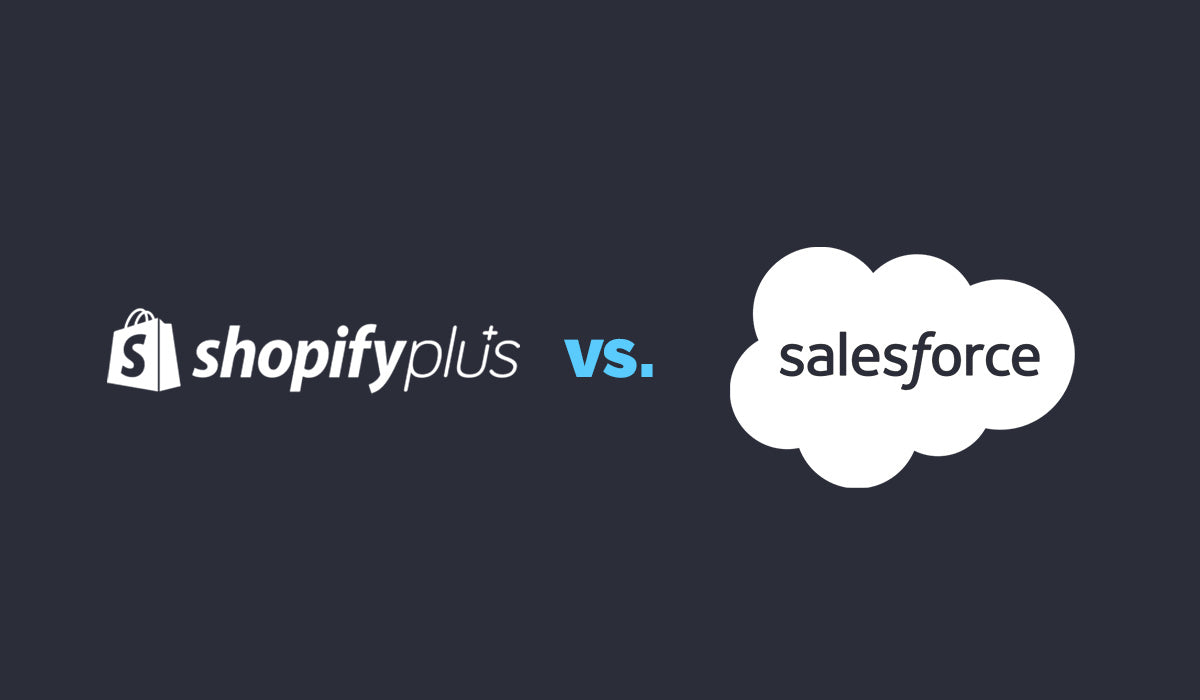Shopify Plus and Salesforce Commerce Cloud are two platforms competing in the enterprise eCommerce segment. But in a scenario where rapid scaling, reducing operational friction, and improving customer experience are top priorities, Shopify Plus stands out as the most efficient and results-focused option .
While many companies still operate under legacy models with platforms like Salesforce Commerce Cloud, more and more leading brands are migrating to Shopify Plus in search of agility, control, and a healthier cost structure.
Two enterprise platforms, two ways of understanding eCommerce
Shopify Plus was designed for brands that need to scale frictionlessly. Its SaaS architecture, global infrastructure, and ecosystem of apps and integrations make it possible to launch, operate, and optimize an eCommerce business without relying on developers or extensive technical teams.
Salesforce Commerce Cloud (formerly Demandware) is a robust platform designed for large corporations with complex structures and a Salesforce-based technology stack. While it offers extensive customization and integration possibilities, its implementation is often lengthy, costly, and highly dependent on specialized developers.
Shopify Plus offers a new way to operate digitally: simpler, faster, and 100% business-focused .
Key benefits of Shopify Plus
Time to market: weeks vs. months
Shopify Plus allows you to launch stores quickly, without cumbersome processes or development dependencies. Salesforce requires long implementation, testing, and integration cycles.
Lower and more predictable costs
Shopify Plus offers a fixed monthly fee that includes up to 10 environments and very low sales commissions, along with priority support and full access to advanced features, providing predictability and allowing for seamless scaling. Salesforce Commerce Cloud, on the other hand, applies expensive licensing and variable fees based on sales volume, and requires ongoing investment in development and infrastructure. This makes the total cost of ownership more expensive and complex.
Native B2B included
Shopify Plus includes built-in B2B features: per-customer pricing, exclusive catalogs, customized payment terms, and a shopping cart—all managed from the admin and without external apps. Salesforce offers similar B2B features but relies on complex configurations and additional development work to achieve the same level of functionality, which often results in technical lock-in and higher operational costs.
Infrastructure without limits
Both Shopify Plus and Salesforce offer a comprehensive and scalable infrastructure. However, Shopify Plus does so with a simpler and more straightforward approach: no technical configuration, external monitoring, or complex deployments required.
Salesforce, while powerful, requires a higher level of configuration and technical resources to operate and scale, which can slow execution times on dynamic business projects.
Integrated AI
Shopify Plus incorporates artificial intelligence tools into the admin panel and shopping experience: product description generation, automated chat responses, personalized storefront recommendations, and predictive content that improves conversions. All without the need for external apps or advanced configuration.
Updates every 6 months
Shopify releases more than 150 feature enhancements every six months, with no action required from the customer. Updates are automatic, with no downtime, maintenance, or technical lock-in.
Less technical dependence
Shopify Plus is designed to give the business team complete autonomy: from content changes to promotion management and multi-store management. In Salesforce, any significant changes typically require specialized technical support.
Optimized and flexible checkout
The Shopify Plus checkout is tested, optimized, and constantly improved based on real-world data from millions of transactions. In Salesforce, the checkout requires development and integration to achieve similar performance.
True, frictionless omnichannel
Shopify Plus makes it easy to connect channels like Instagram, TikTok, marketplaces, and physical stores to POS without the need for complex development. Salesforce has similar capabilities, but generally requires advanced technical configurations.
Secure and scalable infrastructure from day one
Shopify Plus offers global hosting, automatic scalability, security certifications, and seamless updates —all included. Salesforce requires advanced configurations and technical support to achieve the same stability.
When is Shopify Plus clearly superior?
- When the brand wants to scale quickly without heavy technical teams.
- When you're looking for complete autonomy from your eCommerce and marketing team.
- When the priority is to lower costs without losing functionality.
- When you need to operate efficiently across multiple countries and channels.
- When the focus is on conversion, performance, and the shopping experience.
Shopify Plus lets you focus on your business, not your infrastructure.
Conclusion
Salesforce Commerce Cloud is a powerful platform, but its model follows old-school corporate logic: lengthy processes, high costs, and technical dependency. In contrast, Shopify Plus represents the present and future of eCommerce: agility, efficiency, scalability, and a focus on results .
Is your eCommerce business limited by the complexity of Salesforce Commerce Cloud?
At LOP we help brands migrate to Shopify Plus without losing time or focus .
We are certified Shopify Plus partners and eCommerce specialists with 25 years of experience in digital media.
Contact us and find out how we do it: https://lop.global/pages/contacto




Share:
Shopify Plus vs Magento (Adobe Commerce): Agility vs. Complexity
Shopify Plus vs Tiendanube Evolution: When your eCommerce needs to scale without limits